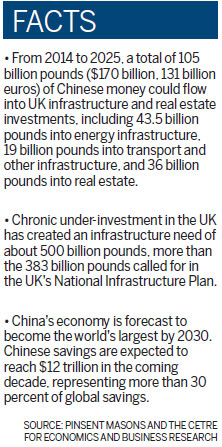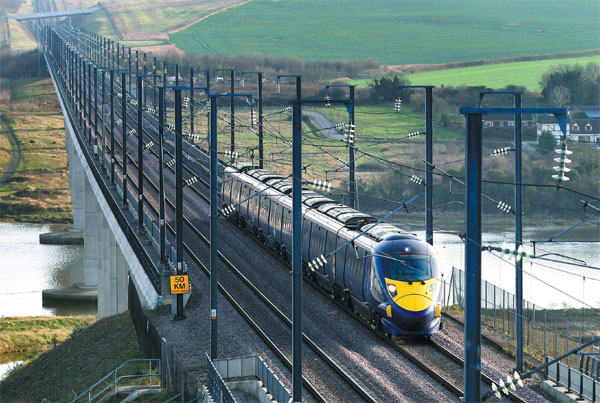Diving right in
Updated: 2015-01-23 10:37
By Cecily Liu(China Daily Europe)
|
|||||||||||
Chinese firms are now bidding for UK infrastructure contracts as a springboard to demonstrate their technical expertise
Chinese companies are increasingly investing in the United Kingdom infrastructure sector, with the potential to invest 105 billion pounds ($170 billion, 131 billion euros) in the energy, property and transport sectors by 2025.
A report released in October by the UK law firm Pinsent Masons and the Centre for Economics and Business Research in London comes at a time when there is a yawning gap between the UK's current infrastructure needs and the amount of investment the British government has planned.
The National Infrastructure Plan drawn up by the UK government identified close to 400 billion pounds of investments that need to be made through 2020, though the report identified real infrastructure needs to be closer to 500 billion pounds.
In the years following the global financial crisis, Chinese companies and sovereign wealth funds have invested in UK infrastructure projects as financial investors.
In 2012, China Investment Corp, the country's sovereign wealth fund, bought an 8.68 percent stake in Thames Water Utilities Ltd and a 10 percent stake in Heathrow Airport Holdings. In 2011, Cheung Kong Infrastructure Holdings bought the UK utility company Northumbrian Water for 2.4 billion pounds.
But since then, Chinese companies have altered course and are now bidding for contracts to use the UK's infrastructure sector as a springboard to demonstrate their technical expertise and expand globally.
Abundant opportunities
Nuclear energy, high-speed rail and commercial business parks are all important areas in which Chinese investors are searching for investment projects.
Two Chinese nuclear power companies have reached an agreement to invest in the UK's first nuclear power stations in two decades.
The two planned reactors are at Hinkley Point C in Somerset. Led by EDF Group of France, the pair of reactors will cost 14 billion pounds. China General Nuclear Power Group and China National Nuclear Corp are expected to have a combined 30 to 40 percent stake in the consortium, with Areva taking another 10 percent.
Another high profile project is the HS2, the UK's high-speed rail network plan that has attracted Chinese interest, although the bidding process for the project has yet to begin. The first phase of construction should start in 2017 and finish in 2026. The first train services will run between London and Birmingham from 2026.
"With nuclear power and high-speed railways, China's technology and experience is abundant. China can prove its strength in both fields by taking part in the UK projects," says Zhou Xiaoming, minister counselor with the economic and commercial office at the Chinese embassy in London.
"In such projects, China's expertise is building them quickly and maintaining quality, which is important for projects where lengthy construction times would require a lot of investment."
In the nuclear industry, for example, construction of Sizewell-B, Britain's most recently built nuclear power station, lasted from 1987 to 1995, though the completion date was within the set target date.
In addition to energy and transport projects, many Chinese real estate and construction companies have invested heavily in greenfield and redevelopment projects in the UK as both investors and contractors.
Beijing Construction Engineering Group's 800 million pound investment in the Airport City Manchester project in Manchester is one such high-profile project. The Chinese construction company will take on a 50-50 split of the project's construction with UK construction company Carillion.
Another is the Chinese developer Advanced Business Park's $1.51 billion (1.16 billion euros) project to transform 14 hectares of the historic Royal Albert Dock into an office complex over the next decade.
Alongside these large-scale infrastructure investments from China, many Chinese construction companies, project design companies and other supply-chain related companies to grow into the UK.
This includes China Building Technique Group Co, a construction company that is a subsidiary of the China Academy of Building Research Architectural Design Institute, known to champion innovative building methods. Another is CIMC Modular Building Systems, which supplies modular building units to UK projects.
Before the Labour Party came into power in 1997, most UK infrastructure projects were funded by the government. Since then, however, there has been greater demand on the central and local governments to find private sector money for projects, says Julia Court, co-head of construction at the law firm King & Wood Mallesons.
This trend accelerated after the 2008 recession, when there was greater pressure on public sector spending in the UK. This coincided with China's emergence on the international scene as an investor, Court says.
With the UK government recognizing the important role Chinese investors could potentially play in the nation's infrastructure sector, UK Trade and Investment has been active in China promoting these opportunities to Chinese investors.
Court says the UK's infrastructure sector is an attractive investment target because of its relative stability and long-term sustainable returns. On average, the returns for both public sector utility infrastructure and private sector infrastructure projects range between 8 and 15 percent.
The returns for greenfield projects, which are new construction projects, are likely to be higher because of the risks associated with building a new project.
Court says investors in UK infrastructure include pension funds, private equity, sovereign wealth funds, individual investors and more recently construction companies.
Traditionally, construction companies only focused on the construction aspect of a project, which generates returns of about 4-5 percent. But in the past 20-30 years, they have become investors in UK infrastructure. By becoming the financial investors in a project, construction companies can maximize their returns.
Challenges ahead
Despite great potential for Chinese investment in UK infrastructure, challenges still persist, one of them being a negative perception of Chinese investment, especially in the nuclear sector.
Last year, Mark Pritchard, an MP and a member of the national security committee, was quoted by the Financial Times as saying that Chinese companies should take only a "minor" role in sensitive sectors such as energy.
Encouragingly, the UK government has dismissed these doubts and fears about Chinese nuclear companies and have given them a level playing field to compete against other international nuclear companies for UK projects.
Ed Davey, British energy and climate change secretary, said in a previous interview with China Daily that Britain's energy market is completely open to Chinese investors both as minority and majority investors.
Tony Ward, UK head of power and utilities at EY, a global consultancy, says there is an international lack of confidence in Chinese nuclear technology, although there is no evidence to support that concern. This is a challenge the Chinese need to overcome by proving themselves step by step in international projects, he says.
"There is a perception internationally that the ability to build complicated reactors in China might be a consequence of corners being cut somewhere. There is no evidence of that."
Another challenge is Chinese companies' lack of understanding of the regulatory system within the UK infrastructure sector, says Richard Laudy, head of infrastructure at Pinsent Masons, an international law firm.
Laudy says bidding companies have to supply a large amount of information in a timely manner and in a structured format to satisfy the needs of the UK infrastructure procurement process.
"The challenge is understanding how the process works. Challenges range from labor market regulations, to the planning process and how to operate within the framework of EU regulations," Laudy says.
Investors bid competitively for UK infrastructure projects, meaning each company or consortium submits a separate application.
This is very different from other markets that take applications on a single tender basis, meaning Chinese investors can directly negotiate with a respective foreign government about the contract, he says.
Laudy says it is helpful for Chinese companies to master the skills needed to navigate within the UK regulatory framework by bidding for projects in partnership with UK or European companies that are more familiar with the process.
cecily.liu@chinadaily.com.cn



|
A Hitachi Class 395 Javelin train passes through Ashford, Kent, using the HS1 Channel Tunnel Rail Link. The HS2, the UK's high-speed rail network plan, has attracted Chinese interest. Provided to China Daily |
(China Daily European Weekly 01/23/2015 page6)
Today's Top News
China offers Swiss $8b quota for yuan trading
Best team China in decade carries countrymen's hope
Russia says DPRK sent positive signal on Kim visit in May
Australia PM quashes rumours of unrest as 'nonsense'
China aims for stronger links with fragile Europe
China to instill national characteristics in think tanks
Shanghai govt releases report on stampede tragedy
Fake condoms, Viagra, seized and online network shut down
Hot Topics
Lunar probe , China growth forecasts, Emission rules get tougher, China seen through 'colored lens', International board,
Editor's Picks

|

|

|

|

|

|






